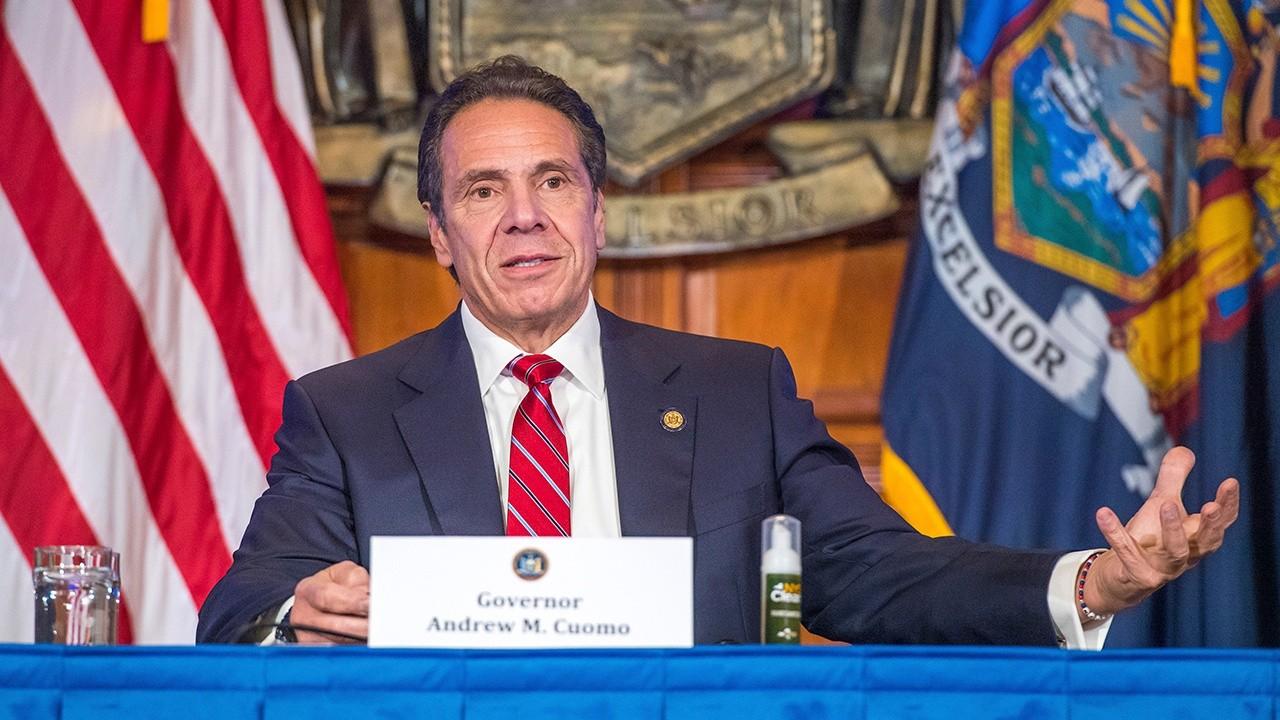Cuomo’s pandemic powers might be tested in Supreme Court case
Supreme Court expected this week to say whether it will hear a challenge by the Roman Catholic Diocese of Brooklyn to the restrictions that Cuomo placed on parts of the borough in October
Since New York's first novel coronavirus case in March, Gov. Andrew Cuomo has issued executive orders closing offices and restaurants, schools and fitness centers. And courts have backed him up almost every time.
More than 30 cases challenging various restrictions were either dismissed or decided in the state's favor, according to a tally provided by a Cuomo administration official. These include lawsuits filed by restaurateurs, gym owners and even the mother of a teenager who challenged the state's decision to ban high-school football.
A law enacted in the pandemic's earliest days bolstered the Democratic governor's position, according to Patricia Salkin, a former dean of Touro Law Center on Long Island. But Mr. Cuomo's orders still face challenges from religious organizations and some state lawmakers who now say there should be limits on the authority they ceded in March.
CUOMO'S CORONAVIRUS RESTRICTIONS ARE 'ARBITRARY DECISIONS NOT BASED ON SCIENCE': PATAKI
The U.S. Supreme Court is expected this week to say whether it will hear a challenge by the Roman Catholic Diocese of Brooklyn to the restrictions that Mr. Cuomo placed on parts of the borough in October.
In response to rising infections, Mr. Cuomo created color-coded limits on mass gatherings and business operations. In the hardest-hit areas, which were designated red zones, the state limited attendance in houses of worship to 25% of their capacity or 10 people, whichever is fewer.
Bishop Nicholas DiMarzio said in an interview that the limits were unfair because secular activities -- like shopping at grocery stores -- were deemed as essential and allowed to continue. The practice of religion is protected by the First Amendment, he said.
"If we were essential, you'd have to look at us differently -- whether we were a grocery store or a pharmacy," Bishop DiMarzio said. "We have been relegated with the bowling alleys."
In May, the Supreme Court declined a request by a California church to halt enforcement of an executive order by Gov. Gavin Newsom that limited attendance at houses of worship to 25% of capacity or 100 people. Chief Justice John Roberts, writing for the majority, wrote that state officials should be given broad latitude -- especially when local conditions were ever-changing.
NEW YORK DEM GOV. CUOMO TO GET PAY RAISE DESPITE STATE'S $63B BUDGET DEFICIT
Attorneys for Mr. Cuomo said in court papers that New York's restrictions don't unfairly target religious organizations. Lower-level federal judges declined to stop the new limits from taking effect despite legal challenges from the diocese and Agudath Israel, an umbrella group representing prominent ultra-Orthodox Jewish rabbis. Agudath is also petitioning the Supreme Court.
The state said in a filing in the Brooklyn Diocese's case that its rules "target the settings that most naturally facilitate Covid-19 spread, namely those in which persons tend to gather closely for an extended period of time." It said worship should be measured against concerts or lectures -- secular activities that were entirely banned.
Mr. Cuomo's senior adviser, Richard Azzopardi, said the state had been "sued virtually every day for virtually every action taken during the pandemic and a vast majority of them have been tossed out of court. Stay smart: Wear a mask, practice social distancing and wash your hands."
The law signed by the governor on March 3 gave him broad new power to issue directives "necessary to cope with" a broad list of potential disasters, including an impending disease outbreak. A directive can be rescinded by a vote of both the state Assembly and Senate, which are controlled by Democrats.
GET FOX BUSINESS ON THE GO BY CLICKING HERE
State Sen. James Skoufis, a Democrat from Orange County, said he became frustrated last week after state officials declared zone-based restrictions in his district but didn't consult with him first, a break from their practice in recent months.
"If this noncooperation is a pattern, then one of our first orders of business as a Legislature should be to put up guardrails -- to force collaboration," he said.
Republicans have been saying this for months, and Assembly Minority Leader Will Barclay, a Republican from Oswego County, said members of his conference will meet this week to hone their strategy.
Mr. Azzopardi, the adviser to Mr. Cuomo, noted both Messrs. Skoufis and Barclay joined the large majority of lawmakers who voted for the bill enhancing the governor's authority. The legislators both said they supported the legislation because some transfer of lawmaking power to the governor was necessary and the measure appropriated $40 million to respond to the pandemic.
A spokesman for Assembly Speaker Carl Heastie reiterated that legislators already have the power to amend Mr. Cuomo's pandemic orders. Mike Murphy, a spokesman for Senate Majority Leader Andrea Stewart-Cousins, said the chamber's Democratic conference would "continue to examine ways to improve the state's response during the pandemic, especially as we appear to be in the midst of a second wave."
CLICK HERE TO READ MORE ON FOX BUSINESS
THE QUESTION: The International Academy of Television Arts & Sciences announced Friday that Mr. Cuomo had won this year's International Emmy Founders Award for his daily coronavirus briefings this year. In this regard, Andrew Cuomo is playing catch-up to his younger brother, CNN host Chris Cuomo. When did Chris Cuomo receive his first Emmy?
-- Know the answer? Write me an email!
THE LAST ANSWER: According to data compiled by the Center for Responsive Politics, the most expensive campaign for a U.S. House of Representatives seat in New York was waged by Rep. Alexandria Ocasio-Cortez against her primary and general election challengers.
Write to Jimmy Vielkind at Jimmy.Vielkind@wsj.com




















